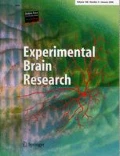Abstract
Any action performed by standing subjects is generally accompanied by compensatory postural activities, which reduce or abolish the postural disturbance generated by the movements and keep the subjects’ center of gravity within the supporting base. These postural activities are triggered by either anticipatory and/or feedback-based control processes, depending on the information available and on the behavioral context. To investigate the respective involvement of these two components in postural control during development, we studied the extent to which the postural equilibrium of children (3- to 10-year-olds) and adults was disturbed by the same physical event, an unloading, depending on whether it was initiated by the subject or externally imposed. The subjects were standing on a force platform with their eyes closed, holding a load (5% of their own body weight) in their hands, with arms vertical and forearms horizontal. Two conditions were applied: (1) the subjects voluntarily released the load and (2) the load was unpredictably removed. The unloading resulted in a backward movement of the center of pressure, which was smaller with self-initiated than imposed disturbances in all age groups. This difference varied depending mainly on the age-related changes in the relative amplitude of the self-initiated disturbance, which decreased between 3- to 5-, and 6- to 8-year-olds (who showed no marked postural instability after self-initiated unloading), and increased again in the two older groups (9- to 10-year-olds and adults), in which it also became more consistent . It was concluded that feedforward control becomes more efficient as children grow up, but that its relative contribution to postural control does not show a monotonic pattern of development.
Similar content being viewed by others
Author information
Authors and Affiliations
Additional information
Received: 20 December 1997 / Accepted: 9 October 1998
Rights and permissions
About this article
Cite this article
Hay, L., Redon, C. Feedforward versus feedback control in children and adults subjected to a postural disturbance. Exp Brain Res 125, 153–162 (1999). https://doi.org/10.1007/s002210050670
Issue Date:
DOI: https://doi.org/10.1007/s002210050670




